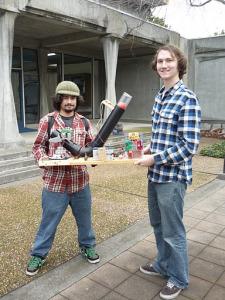Spotlight: Faculty Experiences with Service-Learning
Dr. Farid Farahmand implements a pilot product development project to teach engineering students the principles of universal engineering design
According to Dr. Farid Farahmand, universal design is the design of products and environments to be usable by all people, to the greatest extent possible. Teaching universal design principles allows students to better understand assistive technologies which promote design that are usable by a wide variety of people for a wide range of applications. ES 110 students design a simple electro-mechanical ball throwing machine to assist students with physical disabilities. Using the product, children with special needs become engaged in group physical activities while improving their peer interaction and social skills. Since there is no commercially developed ball-throwing machine for disabled children, this project was very promising for physical education instructors. This project was initially started in the Fall of 2009 and developed in partnership with the Sonoma State University(SSU) Saturday Sidekicks. It is a collaborative effort between the Department of Engineering Science, the Center for Community Engagement and the Adapted Physical Education (APE) program at SSU.
In their final presentation the service-learning students presented a working prototype of their design and described their understanding of universal design concept. Through this project the engineering students learned about the true meaning of barrier-free and easy-to-use design concepts and how the unique needs of the ultimate user of a product are often neglected in the design process. Furthermore, they were exposed to electro-mechanical systems and learned how to use electrical devices to control such systems.
Once again service-learning pedagogy has proved to be highly reciprocal and an effective way of learning. The engineering students were able to learn more about special needs and major concepts in engineering as well as contributing to the community. In the final-class survey students said that this project made them feel more interested in engineering and incorporating engineering concepts for community needs.

Author: Natalie Hambalek



